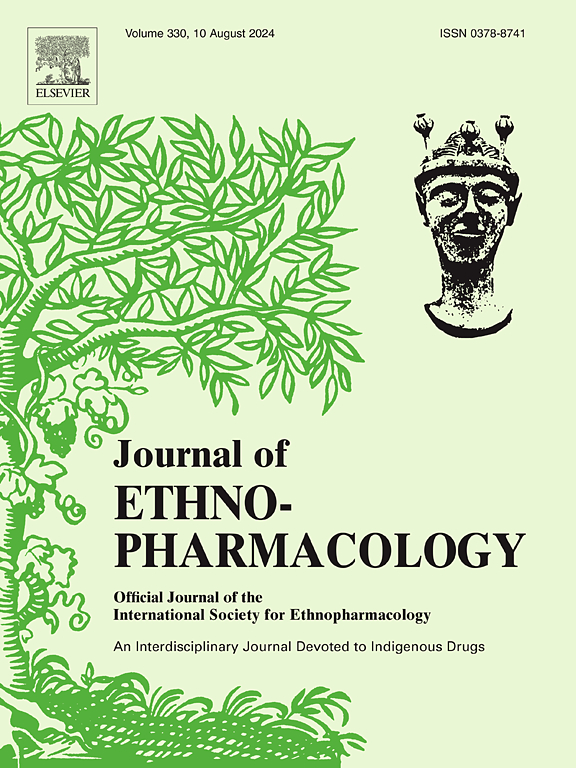植物乳杆菌发酵增强黄萱草对慢性应激小鼠的抗抑郁作用
IF 4.8
2区 医学
Q1 CHEMISTRY, MEDICINAL
引用次数: 0
摘要
民族药理学相关性黄萱草(hemerocallis citrina Baroni),被称为“忘忧草”,是一种以抗抑郁作用而闻名的中药。发酵是一种古老的中药加工方法。发酵是否影响黄霉的抗抑郁作用尚不清楚。目的研究发酵和未发酵黄颡鱼对慢性抑制性应激性抑郁症的影响及其机制。材料与方法与植物乳杆菌菌株LZU-J-TSL-6和LZU-J-LZ1-1共发酵,得到发酵的H. citrina (FH)。研究了黄皮黄酮和黄酮黄酮对慢性约束应激小鼠抑郁和焦虑的影响。结果发酵使黄酮类化合物和酚类化合物含量增加,萜类化合物含量减少。黄精和赤芍均有抗抑郁作用,赤芍缓解抑郁症状的效果更佳。其中,FH能有效缓解CRS所致的体重减轻、行为异常和海马病理损伤,同时显著降低血清皮质醇和炎症因子水平,提高海马5-羟色胺(5-HT)水平。此外,FH可以通过促进有益微生物(如乳杆菌)的定植,抑制有害微生物(如拟杆菌_h)的生长来恢复crs诱导的肠道微生物群失调。重要的是,我们发现FH的抗抑郁作用与l -茶氨酸和肌醇等物质以及丙氨酸、天冬氨酸和谷氨酸的代谢途径密切相关。结论发酵改变了黄皮草有效成分的组成,增强了黄皮草抗抑郁作用。它突出了FH在治疗抑郁症方面的潜在治疗应用。本文章由计算机程序翻译,如有差异,请以英文原文为准。

Lactiplantibacillus plantarum fermentation enhances the antidepressant effects of Hemerocallis citrina Baroni in chronic restraint stress mice
Ethnopharmacological relevance
Hemerocallis citrina Baroni (H. citrina), referred to as ‘Forgetting Sadness Grass,’ is a traditional Chinese medicine (TCM) known for its antidepressant effects. Fermentation is an ancient processing method for TCM. Whether fermentation affects the antidepressant effect of H. citrina is unknown.
Aim
In this study, we aim to evaluate the effect of fermented and unfermented H. citrina on chronic restraint stress-induced depression and the underlying mechanism.
Materials and methods
H. citrina was co-fermented with Lactiplantibacillus plantarum strains LZU-J-TSL-6 and LZU-J-LZ1-1 to produce fermented H. citrina (FH). Both H. citrina and FH were evaluated for effects on depression and anxiety in chronic restraint stress (CRS) mice.
Results
Fermentation increased flavonoids and phenols while reducing terpenoids. Both H. citrina and FH exhibited antidepressant effects, with FH showing superior efficacy in alleviating depressive symptoms. Specifically, FH effectively alleviated weight loss, behavioral abnormalities, and hippocampal pathological damage caused by CRS, while significantly reducing serum levels of cortisol and inflammatory factors, and increasing hippocampal serotonin (5-HT) level. Moreover, FH can restore CRS-induced gut microbiota dysbiosis by promoting the colonization of beneficial microbes, such as Lactobacillus, and inhibiting the growth of harmful microbes, like Bacteroides_H. Importantly, we discovered that the antidepressant effects of FH are closely associated with substances such as L-theanine and myo-inositol, as well as with the metabolic pathways of alanine, aspartic acid, and glutamic acid.
Conclusion
Our findings suggest that fermentation alters the composition of active ingredients in H. citrina and enhance its role in depression. It highlights the potential therapeutic application of FH in treating depression.
求助全文
通过发布文献求助,成功后即可免费获取论文全文。
去求助
来源期刊

Journal of ethnopharmacology
医学-全科医学与补充医学
CiteScore
10.30
自引率
5.60%
发文量
967
审稿时长
77 days
期刊介绍:
The Journal of Ethnopharmacology is dedicated to the exchange of information and understandings about people''s use of plants, fungi, animals, microorganisms and minerals and their biological and pharmacological effects based on the principles established through international conventions. Early people confronted with illness and disease, discovered a wealth of useful therapeutic agents in the plant and animal kingdoms. The empirical knowledge of these medicinal substances and their toxic potential was passed on by oral tradition and sometimes recorded in herbals and other texts on materia medica. Many valuable drugs of today (e.g., atropine, ephedrine, tubocurarine, digoxin, reserpine) came into use through the study of indigenous remedies. Chemists continue to use plant-derived drugs (e.g., morphine, taxol, physostigmine, quinidine, emetine) as prototypes in their attempts to develop more effective and less toxic medicinals.
 求助内容:
求助内容: 应助结果提醒方式:
应助结果提醒方式:


